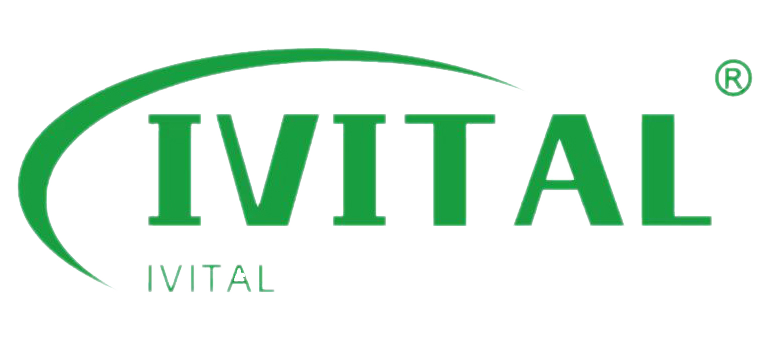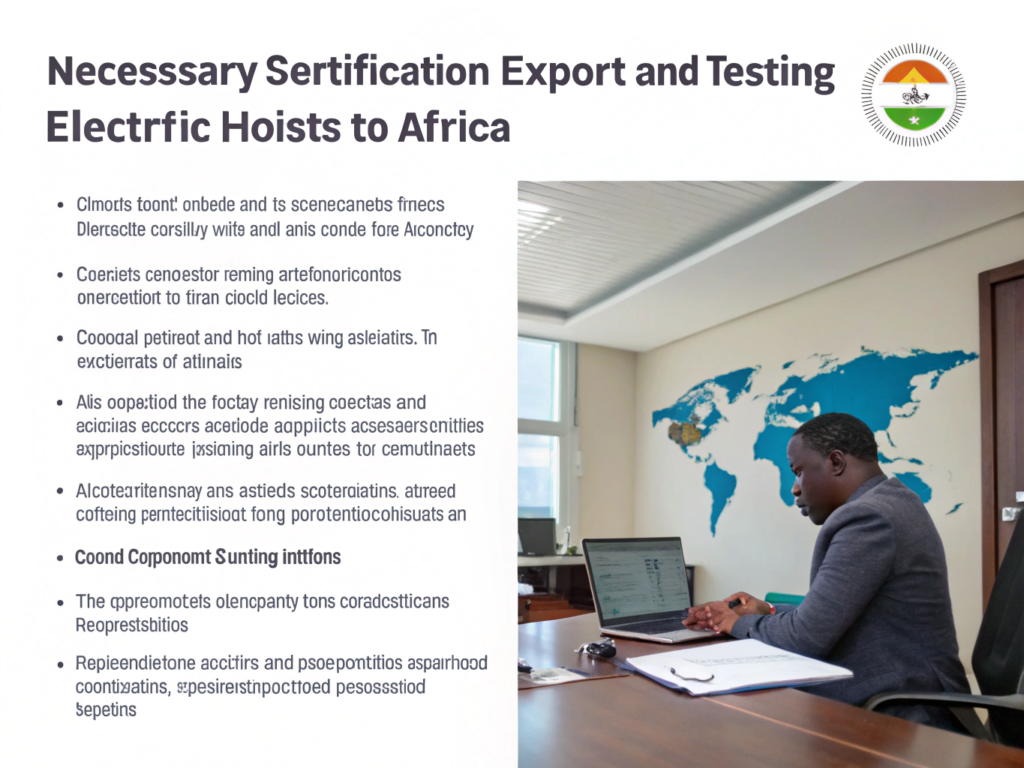I still remember the first time I exported electric hoists to Africa. My shipment got delayed because I didn’t understand the certifications. That mistake taught me a valuable lesson.
To export electric hoists to Africa, you need SABS certification for South Africa, SONCAP for Nigeria, and KEBS certification for Kenya. These certifications ensure compliance with local safety standards and smooth customs clearance.
After that experience, I made sure every export followed the rules. This guide explains the steps I take to get certified before shipping electric hoists to Africa.
[Table of contents]
- What is SABS Certification in South Africa and How Do I Get It?
- How Does SONCAP Certification Work in Nigeria?
- How Do I Obtain KEBS Certification for Electric Hoists in Kenya?
- How Long Do SABS, SONCAP, and KEBS Certifications Take?
- How Can I Ensure Smooth Customs Clearance for Electric Hoists in Africa?
- What Are the Benefits of Getting Certified Before Exporting Electric Hoists to Africa?
- Where Can I Find Help with African Electric Hoist Certifications?
What is SABS Certification in South Africa and How Do I Get It?
The first time I exported to South Africa, I had no idea about SABS certification. Customs wouldn’t clear my goods until I sorted it out.
SABS certification ensures your electric hoists meet South African safety and quality standards. Without it, you can’t legally sell or distribute them in South Africa.
How I Got SABS Certification
Steps I Follow
- I contacted the South African Bureau of Standards (SABS).
- I submitted a detailed application with product specifications.
- I provided samples for testing at an SABS-accredited laboratory.
- My products passed compliance checks, and I received my SABS certificate.
Documents I Prepared
| Document Name | Purpose |
|---|---|
| Product Technical File | Describes product details and materials |
| Test Reports | Verifies product safety and quality |
| Declaration of Conformity | Manufacturer’s commitment to compliance |
| SABS Application Form | Starts the certification process |
How Long It Took
For me, it took about 8 to 12 weeks. The product testing was the longest step.
My Advice
SABS labs can be busy. Book your testing slots early to avoid delays. I learned this the hard way.
How Does SONCAP Certification Work in Nigeria?
I once shipped electric hoists to Nigeria without SONCAP. They never cleared customs. Now I never skip this step.
SONCAP certification confirms that electric hoists meet Nigerian regulations. Without it, customs will reject your shipment.
How I Got SONCAP Certified
Step-by-Step Process
- I registered my product with the Standards Organisation of Nigeria (SON).
- I worked with an approved inspection agency (I used SGS).
- I submitted the Product Certificate (PC).
- After product evaluation, I received the SONCAP Certificate (SC) needed for clearance.
Documents I Submitted
| Document Name | Purpose |
|---|---|
| Product Certificate (PC) | Proof of product compliance with SON rules |
| Commercial Invoice | Details of the transaction |
| Packing List | Lists items in the shipment |
| Bill of Lading | Shipping document for customs clearance |
How Long It Took
The entire process took me about 4 to 6 weeks. The inspection was quicker because I had all documents ready.
What I Learned
I made sure to update my PC regularly. An expired certificate caused me a delay once.
How Do I Obtain KEBS Certification for Electric Hoists in Kenya?
My first shipment to Kenya was delayed because I didn’t have KEBS approval. Now it’s always on my checklist.
KEBS certification ensures your electric hoists comply with Kenyan standards. It’s mandatory for customs clearance.
How I Got KEBS Certification
Step-by-Step Process
- I registered with the Kenya Bureau of Standards (KEBS).
- I submitted my product documents and test reports.
- I worked with a KEBS-approved PVoC agent to inspect my shipment.
- I received the Certificate of Conformity (CoC), which I used for customs clearance.
Documents I Provided
| Document Name | Purpose |
|---|---|
| Product Technical File | Shows product specs and usage details |
| Accredited Test Reports | Verifies product safety compliance |
| Proforma Invoice | Gives shipment and pricing details |
| PVoC CoC Certificate | Required for customs clearance in Kenya |
How Long It Took
It took me about 3 to 5 weeks. Working with a good PVoC agent helped speed things up.
My Advice
I recommend scheduling inspections early. My PVoC agent gave me clear guidance that saved me time.
How Long Do SABS, SONCAP, and KEBS Certifications Take?
I learned early on that certification takes time. Planning is everything.
SABS takes 8 to 12 weeks, SONCAP takes 4 to 6 weeks, and KEBS takes 3 to 5 weeks. The time depends on how ready your documents are.
My Certification Timelines
| Certification | Timeframe | Key Steps |
|---|---|---|
| SABS (South Africa) | 8-12 weeks | Application, testing, approval |
| SONCAP (Nigeria) | 4-6 weeks | Registration, inspection, CoC |
| KEBS (Kenya) | 3-5 weeks | PVoC inspection, CoC issuance |
Factors That Delayed Me
- Incomplete documents
- Last-minute changes in regulations
- Delays in product testing at labs
How I Reduced Delays
I kept in regular contact with my certification bodies. A weekly follow-up kept things moving.
How Can I Ensure Smooth Customs Clearance for Electric Hoists in Africa?
I once had goods stuck at the port for two months because of one missing document. I don’t make that mistake anymore.
To clear customs in Africa, you need valid SABS, SONCAP, or KEBS certificates, plus all required shipping documents.
My Customs Clearance Checklist
Documents I Always Prepare
- SABS Certificate (South Africa)
- SONCAP Certificate (Nigeria)
- KEBS CoC (Kenya)
- Commercial Invoice
- Packing List
- Bill of Lading
- Product Test Reports (if requested)
Common Mistakes I Made
- Wrong HS Codes
- Expired certificates
- Incomplete inspection documents
My Solution
I now work with experienced customs brokers who know the local rules. It saves me time and money.
What Are the Benefits of Getting Certified Before Exporting Electric Hoists to Africa?
I used to think certification was just paperwork. Now I know it opens doors.
Certification helps avoid customs delays, ensures legal compliance, and builds buyer trust in Africa.
My Experience After Getting Certified
| Benefit | How It Helped Me |
|---|---|
| Faster Customs Clearance | No more long port delays |
| Legal Compliance | No fines or rejected shipments |
| Increased Buyer Confidence | Easier to win contracts |
Real Results
Once I had SABS and SONCAP, a mining client in Nigeria chose my company over the competition.
Where Can I Find Help with African Electric Hoist Certifications?
I didn’t figure this out alone. Good advice saved me more than once.
I recommend using certification consultants, working with local agents, and attending African trade fairs.
Where I Got Help
- Certification Bodies: SABS, SON, KEBS
- Agents & Consultants: Helped with PVoC and SONCAP processes
- Trade Shows: Africa Machinery & Equipment Exhibition, local chamber of commerce events
Helpful Links
Conclusion
Certification clears the way for smooth exports of electric hoists to Africa.



